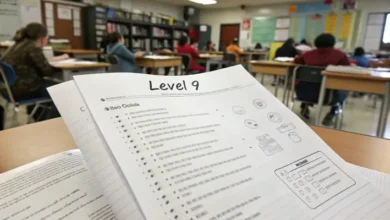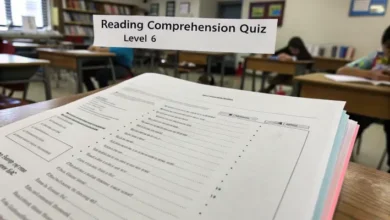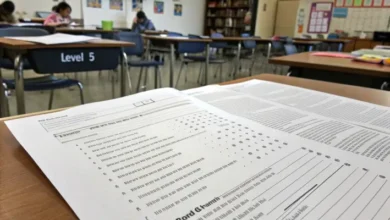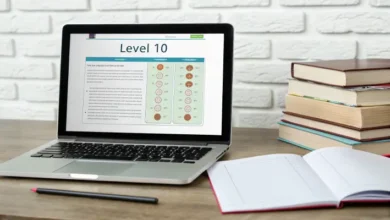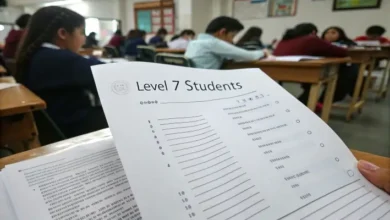Free reading comprehension quiz level 4

Warning: Undefined array key "HTTP_SEC_FETCH_SITE" in /home/domnutda/westdat.com/wp-content/plugins/quiz-maker/includes/class-quiz-maker-iframe.php on line 71
Warning: Undefined array key "HTTP_SEC_FETCH_SITE" in /home/domnutda/westdat.com/wp-content/plugins/quiz-maker/includes/class-quiz-maker-iframe.php on line 71
Free reading comprehension quiz
Free Reading Comprehension Quiz Level 4
Reading comprehension is a critical skill for learners of all ages. At level 4, students are expected to delve into more intricate texts and articulate a detailed understanding of what they’ve absorbed.
Therefore, a comprehensive quiz is an exceptional tool to evaluate and enhance students’ abilities to interpret and infer from a given reading material.
Let’s dive into the fabric of the ultimate level 4 reading comprehension quiz, designed to stretch the cognitive capabilities and enrich the literary repertoire of readers.
Structure of the Reading Comprehension Quiz
1. Diverse Reading Passages
- Passages from classic literature
- Non-fiction articles exploring scientific discoveries
- Excerpts from modern-day op-eds
- Snippets of eloquent poetry
Each passage is crafted to reflect the intricate layers of syntax and vocabulary that level 4 readers are encouraged to master. These selections not only test recall but also the capability to engage with more abstract and inferential thinking.
2. Layered Question Sets
- Literal Comprehension: Questions that test the ability to identify direct facts and details from the text.
- Inferential Understanding: Queries that require readers to read between the lines and make logical inferences based on information not explicitly stated.
- Critical Analysis: Challenges that push for interpretation of themes, character motives, and the author’s purpose.
- Vocabulary in Context: Items where students discern the meaning of complex words within the text.
3. Quiz Format Variation
- Multiple Choice: Where students are to choose the correct answer from several options.
- Short Answer: This requires concise responses directly referencing the text.
- Essay Response: In-depth questions designed for elaborate answers that demonstrate a full and nuanced understanding of the passage.
Preparing for the Quiz
Before diving into the quiz itself, here are several tips to ensure maximum success:
- Preview the Material: Skimming the passage initially can help outline the main ideas and structure. It also prepares the reader for potential vocabularies and themes.
- Annotate While Reading: Making notes or highlighting can be very helpful. Underline key points, jot down thoughts on the margin, and bracket sections that seem particularly significant.
- Context Clues: Use hints within the sentences to decipher the meanings of unfamiliar words, rather than rushing to a dictionary.
Example Passage: “Exploring the Cosmos: The Future of Space Travel”
In the domain of science, humans have always strived toward the great beyond, the infinite expanse – space. The myriad celestial bodies have beckoned us, promising secrets as vast as the universe itself. Mankind has responded with vessels to bridge the gulf between Earth and the stars. But what does the future hold for space travel?
Questions:
- According to the passage, what drives humans to explore space?
- Identify a metaphor used in the text and explain its meaning in the context.
- Predict some of the advancements that might be made in space travel in the future.
The Main Body of the Quiz
Following the preparation section, the bulk of the quiz would incorporate sections that evaluate:
- Passage Comprehension: Extracting information from each passage including recognizing the main ideas and supporting details.
- Critical Thinking: Assess how well the reader can ask questions, reason, and synthesize information from the texts.
- Reflective Responses: After completing the questions, students articulate what they learned from the texts and how it may apply to other areas of study or life.
Constructing High-Quality Questions
To promote high-level thinking, questions are framed in a manner that extends beyond the text. They might look like this:
- What are the possible implications of the author’s views on environmental policy?
- How might the protagonist’s decisions be perceived in today’s context?
- Relate the themes explored in the poem to a current world event.
At this phase, students should also encounter diagrammatic representations of data or narrative situations, further challenging their interpretative skills.
Evaluating the Quiz Results
Upon completion of the quiz, evaluation centers not just on the quantity of correct answers, but the richness of the students’ responses. Quality feedback addresses:
- The astuteness of insights gleaned from reading passages.
- The efficacy of argumentation in essay questions.
- The adeptness in using supporting evidence for their conclusions.
A profound comprehension quiz at level 4 is not merely a measure of literary knowledge, but a testament to a student’s intellectual bravery and imaginative prowess.
Free reading comprehension quiz level 4

Enhance your reading skills with our printable comprehension quiz for level 4. Practice and improve your understanding of various texts for free.
Conclusion
In the labyrinth of words and worlds that reading comprehension at level 4 represents, developing a quiz that challenges students to confront and engage with complex texts is essential.
Such quizzes not only evaluate students’ understanding of what they read but also further their academic and interpersonal skills by encouraging a deep and intricate relation with language.
From exploring the broad universe in non-fiction to discerning the subtle hues of human emotion in literature, the readers emerge not just as students, but as comprehensive thinkers, ready to apply their skills beyond the confines of the quiz.

